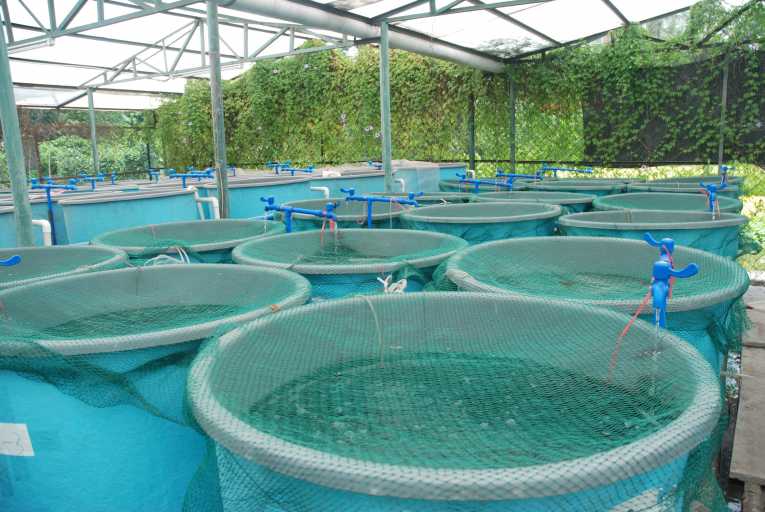In the past few years, demand for fish and seafood products has been growing steadily and environmental organizations such as IUCN have expressed great concern that oceans may soon reach the point of no return if overfishing continues.
The idea of growing fish artificially outside of the oceans sprung in the 1970s and since then fish farms have been supplying much of the seafood produce in the shops. According to a report by the UN Fish and Agriculture Organization, aquaculture (artificially grown seafood) provides over 47% of total world supply of seafood.
Although it may seem like the ideal solution, farming fish in closed indoor pools or cages has several very serious flaws. In closed breading pools the fish are fed antibiotics to prevent them from getting and spreading diseases in overcrowded conditions. Farmers also apply toxic chemicals on cages of fish and shrimps to prevent other fish from preying on the fish inside the cages. On many occasions infected fish that escape from the cages, cause outbreaks of diseases among wild fish and financial damages and health risks often follow.
Prof. Jaap Van Rijn from the Hebrew University in Jerusalem realized the potential in fish farming, recognized the weaknesses of the system and came up with a solution. Van Rijn's patent is the first step to truly sustainable and ecologically safe aquaculture. He developed a unique zero-discharge closed recirculation system that doesn't depend on location and is not polluting.
Fish farms that exist all over the world today and bread fish in closed indoor pools can only be located near a large water source (sea or ocean). The circulation system flushes the water back into the source, contaminating it with PCBs and Dioxins that exist in fish waste. The cage farms dispose of the waste straight into the ocean killing the delicate sea-bed organisms. This poses an enormous ecological threat to the delicate marine eco-systems. "Worldwide, significant areas of coastal habitats are being lost because of human activity", says Prof Dan Laffoley, a British ocean conservationist and Marine Vice chair of IUCNs World Commission on Protected Areas organization. He stresses that "extensive areas have been altered by land reclamation and fish farming, while coastal pollution and overfishing have further damaged habitats and reduced the variety of species."
Ecologically, Van Rijn's patent is the most advanced in sustainable aquaculture yet. "The invention is based on culturing either freshwater fish or marine fish in a closed aquaculture system", says Van Rijn. The uniqueness of this system is that the pools are filled only once and then water added only to cope with evaporation losses (less than 1% of the total water volume per day). Van Rijn explains that "operating the system without water exchange allows [for the first time] to grow marine fish away from the sea. These marine systems are filled initially with freshwater to which sea salt is added". At the end of the trial period, the system produced less than 10% of organic residue from total feed quantity. No toxic matter (ammonia and nitrite), antibiotics, mercury or led were found in the pools through the entire period.
The first eco-clean fish farm using this patent opened in Israel a few years ago and began breading Sea Breams and Sea Bass. A fully operating farm that produces 500-600 tones annually of Sea Bream or Sea Bass costs up to $5M. Dotan Bar-Noy, C.E.O of the operating Grow Fish Anywhere group, says that "in the future the price [of operating such farms] will be reduced by 10-20% with higher efficiency of design". But the long-term financial implications of running this kind of farm are even more far-reaching. One reason is that there're no environmental damage costs or payouts due to contaminated or escaped fish. Another is that this system can benefit not only coastal countries, but those in the desert as well, increasing the 'green job' potential anywhere in the world.
The next stop on the map for the eco-friendly system is the US. Last year GFA partnered with an American Sanit Corporation based in New York's Columbia County to create the "Local Ocean" group, a first-of-its-kind re-circulating saltwater commercial aquaculture operation. Following the initial success of the farm, GFA say the American farm is expected to grow further. In addition to growing Mediterranean Sea bass, Local Ocean plans for the farm to be a research and development facility as well. When the patent is picked up by more countries, it is likely to replace at least some of the existing farms because for the first time "operating the system without water exchange allows us to grow marine fish away from the sea", says Van Rijn.
The potential of the new system is enormous, as can be seen both in Israel and the US, but there's further room for improvement. The most noticeable 'imperfection' of the system is the fact that the carnivorous fish, such as Salmon and Mackerel, are still fed fingerlings (small fish processed with other nutrition ingredients to produce fish feed). Although the filtration system deals with feed residues effectively, it still means small fish continue to be fished out of the oceans. "This is still a problem with aquaculture concept in general. You feed big fish with small ones", says Bar-Noy, "but Van Rijn's system is still ahead of existing farms because intensive systems (such as ours) have a better FCR (food conversion ratio) than other method. In order to raise 0.5 Kg of Sea Bream we have to feed it ~0.65kg of food. Other methods (such as cages) have to feed the fish around 1kg".
Both farms show promising results, especially when it comes to fish quality and cessation of water pollution but they are still very new and have place for improvement. The next few years, particularly at the Hudson farm, will determine whether the system's organic disintegration filter will live up to its promise.
Image Credit: Aquaculture © Defun










